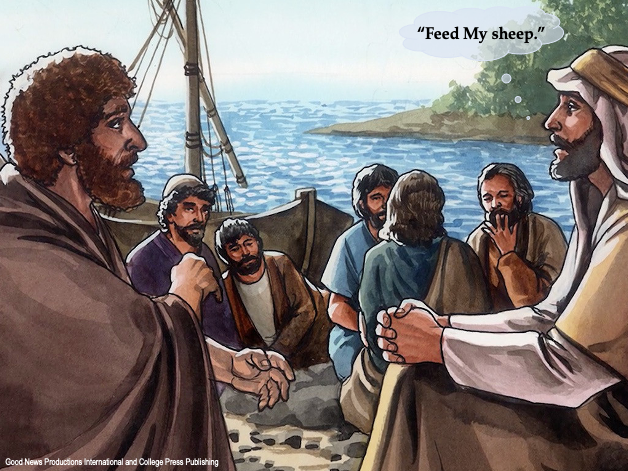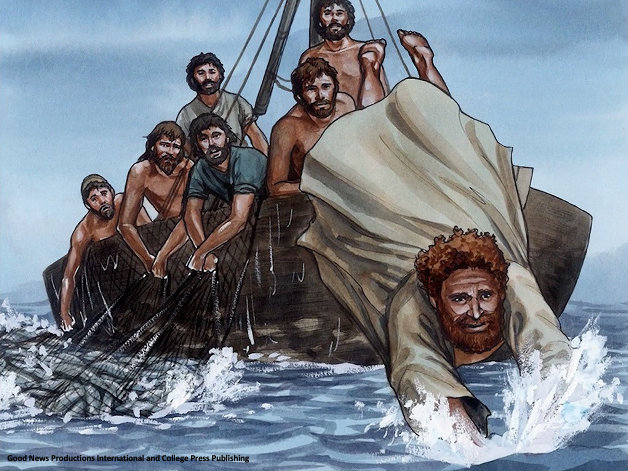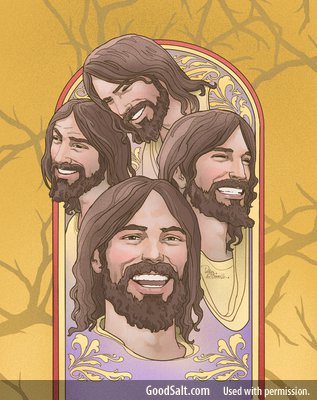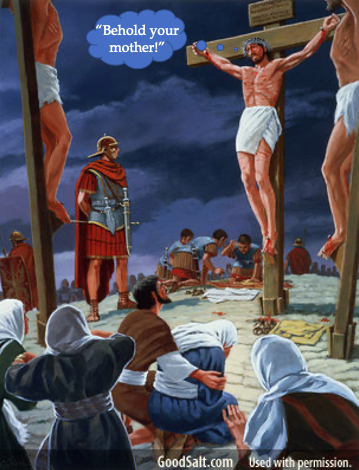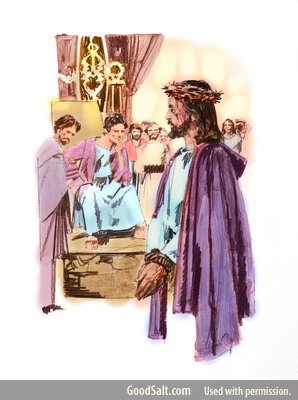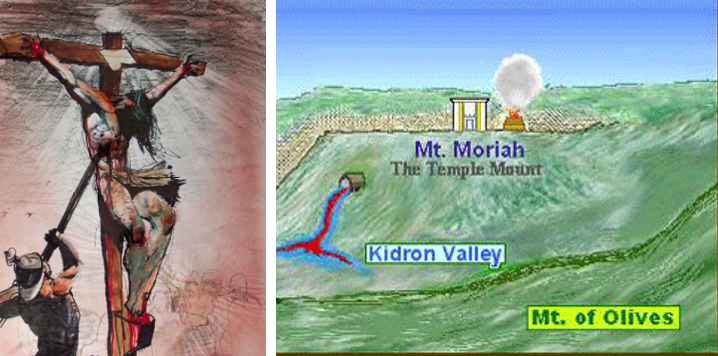“He said to him the third time, ‘Simon, son of Jonah, do you love Me?’ Peter was grieved because He said to him the third time, ‘Do you love Me?’ And he said to Him, ‘Lord, You know all things; You know that I love You.’ Jesus said to him, ‘Feed My sheep.’ ” John 21:17
Twelve-year-old Kurt never missed a game of his Little League team, but he didn’t get to play much because of his small size and lack of coordination. The coach never let him play more than the two innings a game required by league rules. Even with Kurt’s participation, the team won many games and qualified for the playoffs. After the last practice before the playoff game, the coach drew Kurt aside and said, “Kurt, just don’t show up on Saturday for the game. It will be better for the team if you are not there.” A dejected twelve-year-old left the field that day.
Peter also felt the sting of despair. He had denied the Lord three times and swore that he was not one of His followers while in the courtyard in front of Annas’ house (John 18:17, 25, 27). After Jesus’ resurrection, Peter may have thought Christ no longer wanted him on His team, so he returned to fishing. Because of his failure, Peter may have felt unworthy to serve as a leader any longer. Perhaps he thought his public denials of Jesus disqualified him as a follower of Christ.
All of us can probably relate to this. We, too, have failed Christ and we feel unworthy to be on His team. We might think our sin is unforgivable or unredeemable. We fear that Jesus would not want us on His team. But please understand that Jesus never says to a repentant child of God, “Don’t show up.” Christ always gives a second chance to those who seek His forgiveness.
We are learning from John 21:15-19 how the risen Lord Jesus can use us to make a difference in peoples’ lives after we fail. Last time we discovered He can do this when we make loving Him our first priority (John 21:15). Three times Peter had said he did not even know the Lord Jesus, now three times after breakfast, he would say he loved the Lord. Jesus asked Peter, “Do you love [agapaō] Me more than these?” (John 21:15a). When Peter replied, “Yes, Lord; You know that I love [phileō] You,” Jesus said to him, “Feed My lambs.” (John 21:15b).
The word Jesus used for “love” is agapaō and is often used of God’s unconditional sacrificial love. But the word Peter used for “love” is phileō and refers to a brotherly and affectionate love that is between close friends. But Christ does not stop with this one question.
“He said to him again a second time, ‘Simon, son of Jonah, do you love Me?’ He said to Him, ‘Yes, Lord; You know that I love You.’ He said to him, ‘Tend My sheep.’” (John 21:16). Again, Jesus begins with “Simon, son of Jonah,” to emphasize the importance of what He was about to say to Peter. Jesus uses the same word for “love” (agapaō) to ask Peter a second time, only He drops off the “more than these” to encourage a more positive response. 1 “In His first question the Lord challenged the superiority of Peter’s love. In His second question the Lord challenged whether Peter had any love at all.” 2
Peter replied using the same words as the first time, “Yes, Lord; You know that I love You.” Again,Peter appeals to Jesus’ knowledge as proof of his love for Jesus, not his own former behavior. Before Jesus’ crucifixion, Peter had proudly claimed that his love for and commitment to Jesus was superior to that of the other disciples (Matthew 26:33, 35; Luke 22:33; John 13:37). But after his failure and denials, Peter now exhibits more humility.
Seeing Peter’s humility, Jesus says, “Tend My sheep.” The word for “tend” (poimaínō) in the original Greek language means “to watch out for other people, to shepherd, of activity that protects, rules, governs, fosters … in the sense of lead, guide, or rule.” 3 This word means “to be a shepherd” or “take care of” flocks. Both Paul and Peter use this word to speak of the spiritual responsibilities of church leaders (Acts 20:28; I Peter 5:2). 4 The word for “sheep” (probata) is a diminutive form of the more common word for sheep, probaton, and means “little sheep.” 5 It is quite possible Jesus is referring to believers who are not yet fully mature in their faith.
John then tells us, “He said to him the third time, ‘Simon, son of Jonah, do you love Me?’ Peter was grieved because He said to him the third time, ‘Do you love Me?’ And he said to Him, ‘Lord, You know all things; You know that I love You.’ Jesus said to him, ‘Feed My sheep.’ ” (John 21:17). For a third time, Jesus says, “Simon, son of Jonah,” to emphasize the extreme importance of what He was about to say. When Jesus asks, “Do you love Me?” He uses the same word for “love” (phileō) that Peter used.
John notes that “Peter was grieved because He said to him the third time, ‘Do you love Me?’ ” The word for “grieved” is lupeō which means “to become sad, sorrowful, distressed.” 6 Was Peter hurt because Jesus used the same word for love (phileō) that Peter had used or was he hurt because Jesus asked him a third time if he loved Him? I believe Peter was hurt because when Jesus asked him a third time, it reminded Peter of his three denials. 7 Peter had denied knowing Jesus early in the morning when standing around “coals of fire” (John 18:15-18, 25-27), and now Jesus was asking him three times if he loved Him early in the morning while being around “coals of fire” (John 21:1-17).
“Seeing Peter humbled, Jesus came down to Peter’s level and met him where he was. Peter was grieved. His three denials of his Lord had now been matched by a question from his Lord repeated three times: ‘Do you love me?’ It broke Peter’s heart.” 8
All Peter could do is say, “Lord, You know all things; You know that I love You.” This time Peter appeals to Jesus’ omniscience (“You know all things”). “When Peter was proudly self-assured about his ability to stand fast at a critical moment, Jesus knew that he would actually crack under pressure (see 13:37-38). He knew Peter’s heart better than Peter did. The grieving disciple understood that now. And since Jesus knew all things, Peter was convinced that Jesus also knew that Peter loved him in spite of his prior failure.” 9
It may have also grieved Peter that Jesus was asking him questions that He already knew the answers to. 10 But these questions from Jesus were for Peter’s benefit, not the Lord’s benefit.
After Peter told Jesus a third time that he loved Him, Jesus said, “Feed My sheep.” Here Jesus uses the word boskō (“feed”) from verse 15, and the word probaton (“sheep”) from verse 16. Three times Peter had denied knowing Jesus. And now three times Peter affirms his love for Jesus and three times Jesus commissioned Peter to feed His lambs or sheep. This whole scene was intended to show Peter that he is completely forgiven and restored to his position of leadership! Imagine Peter’s joy when for each of his three denials, Christ commissioned him to feed or shepherd His sheep. Peter knew he was forgiven, and he would serve Christ until his dying day!
Peter reminds us, that no matter how great a Christian is, he or she may fall away from the Lord. And when they do, they need to know that Christ always gives a second chance to His humble followers.
Jesus gave Peter three opportunities to say “I love you” to erase the three-fold denial that had happened in the courtyard the night before Christ’s crucifixion. The truth is Simon Peter failed Jesus miserably. But Jesus Christ forgave him magnificently!
Jesus wants to do the same for you and for me. Failure is overcome by forgiveness. There is no other way. If we want to make a difference in peoples’ lives, we must learn this important lesson. Sometimes we try to overcome our failures by trying harder or being “better” Christians. But trying harder or trying to be “better” Christians only makes things worse. Our failures are always overcome by the forgiving grace of Jesus Christ.
Jesus gave Peter three opportunities to declare his love for Him because He wanted him to take His forgiveness into his heart where it really mattered. It is one thing to know about the forgiveness of Christ. But it is another thing to take it to heart.
There may be many of us, if the truth were known, who know about the forgiveness of Jesus Christ. We know in our heads that He died on the cross for all our sins, and on this basis, He is willing to forgive all our sins. We even know that when we trusted Christ for His gift of eternal life, Jesus promised to forgive all our sins (Acts 10:43; Colossians 2:13-14).
But when it comes to the worst sin in our lives that we can look back on, the truth is many of us have not taken Jesus’ forgiveness to heart yet. Oh, we know we have eternal life by virtue of believing in Jesus (I John 5:13). But we have not heard Jesus say, “I forgive you” yet in that area of our greatest sin. Maybe that is the reason God brought you to this page, to hear Him say, “I forgive you,” so you can take it into the depths of your heart and soul.
Keep in mind that Peter had believed in Jesus three years before Christ’s crucifixion (John 1:35-2:11; 6:69). And when Peter came to faith in Christ, Jesus changed his name from Simon to Cephas, which means a stone or rock (John 1:42). Why did Jesus change his name? Because Jesus knew the leadership role that Peter would play when He saw Peter in rough form. Peter would become a rock-solid leader among leaders.
Prior to Peter’s denial of Jesus, he had been walking with the Lord over three years. But Peter failed the Lord miserably when He denied knowing Jesus three times. He was probably uncertain about having a future ministry for his Lord and Savior after his great failure. He probably felt unworthy to be Jesus’ disciple. Therefore Jesus took special time with Peter to make sure he took Christ’s forgiveness into his heart so he would not carry that burden of guilt or shame into the future.
If the risen Lord Jesus is going to be able to use us to make a difference in peoples’ lives after we fail, WE MUST RECEIVE HIS FORGIVING GRACE INTO OUR HEARTS FOR OUR GREATEST SINS (JOHN 21:16-17). If we want to take to heart the forgiveness of Christ, we need to do it the same way Peter did. We look at Jesus’ word and we let His word come into our hearts and give us the assurance that His forgiveness has restored our fellowship or closeness with God.
What does God say a Christian is to do after he or she sins? John tells us in his first epistle, “If we confess our sins, He is faithful and just to forgive us our sins and to cleanse us from all unrighteousness.” (I John 1:9). To “confess” (homologeō), means “to agree, admit, acknowledge.” 11 When we confess our sins to God we are agreeing with what God says about our sin. It is not merely a mistake or weakness. It is an offense against our holy God.
And the moment we confess our sin to God, He is “faithful and just” to forgive the sin we confessed and cleanse us of all our unknown sins (“all unrighteousness”) as well. God restores us to a harmonious relationship with Himself. The word “just” (dikaios) means “righteous.” “Because of the shed blood of Christ (v 7), there is no compromise of God’s righteousness when He forgives.” 12 Jesus’ sacrifice on the cross satisfied God’s “just” demand to punish all our sin. When we confess our sins, God’s cleansing is total.
It is possible that even when God forgives us after we confess our sins, we stubbornly refuse to forgive ourselves. How long does it take us to forgive ourselves? Since God is ready and willing to forgive us when we seek His forgiveness (Psalm 86:5), what gives us the right not to forgive ourselves? If you are struggling to forgive yourself after God has forgiven you, take some time to write I John 1:9 down on a piece of paper. Then insert your greatest sins for the word “sins” in that verse. Draw a picture representing this truth so it can be installed into your right (limbic) brain. Review this verse and drawing every night before you go to sleep so God the Holy Spirit can massage it down into the depths of your heart and soul as you sleep. Choose to forget what God has already forgiven.
As stated earlier, Jesus used the word phileō the third time to meet Peter where he was at. Jesus was saying to Peter (and to us), “I want to meet you where you are at and walk with you on this journey called discipleship. I want to help you grow in your love for Me. I want to give you a vision of what you can become as My grace works in and through you to feed others spiritually.”
We are not on this journey alone. We have a great and sympathetic high priest who understands our struggles and longs to come alongside us to give us the grace and mercy we need (Hebrews 4:15-16). There is probably not one of us reading this article that feels like we love Jesus Christ the way He deserves. We love Him the best we know how, yet we know there is a lot of room for growth. I hope that all of us want to grow in our love for Jesus.
Jesus said to Peter, “Do you love Me with everything you have every moment of your life?” If we are honest with ourselves, we would say to the Lord, “Jesus, I want to love You more in the way You deserve, but I fall way short of that. I need Your help.” That is sort of what Peter was saying to Jesus. So, Jesus came the third time and said, “Peter, I know you are trying to grow in Your love for Me. I want to come alongside you and help you do that.” This is what Jesus wants to do for you and me. He takes us where we are and helps us grow in the love we have for Him.
Interestingly, each time Jesus commands Peter to “tend” or “feed” His sheep, He uses present tense verbs (boske… poimaine… boske). This indicates that the feeding process is to be repeated and regular. A meal or two now and then will not develop strong sheep. Nor will a sermon now and then build strong disciples of Jesus. We need to be fed repeatedly, regularly, and often.
“Though Peter had previously thought highly of himself, he had come to adopt Jesus’s view of leadership in ministry. Peter understood that being a leader of God’s people is not about arrogantly exercising power. Therefore, he could later write to other church leaders, ‘Shepherd God’s flock among you . . . not lording it over those entrusted to you, but being examples to the flock’ (1 Pet 5:2-3). Peter had taken to heart Jesus’s command, ‘Shepherd my sheep.’ Sometimes God lets his people fail in order to develop them spiritually and prepare them for greater usefulness (see Luke 22:31-32).” 13
Although Peter failed the risen Lord Jesus greatly, Jesus did not take Him off His team. To the risen Lord Jesus, winning men and women, and boys and girls is more important than winning games. Imagine Peter’s joy when for each of his three denials, Christ commissioned Peter to feed His sheep. Peter knew he was forgiven and restored. And he served Christ until his dying day. Jesus wants us to know and experience that we are forgiven so we can serve Him until He says it is time to come home to Him.
Prayer: Lord Jesus, many of us needed to hear this message from You. We have felt disqualified from serving You because of our past failures. We know in our heads that we are completely forgiven the moment we believed in You for eternal salvation, but our feelings keep lying to us. We have let them convince us that we are unworthy to be on Your team. Thank You so much for reminding us that our failures are not final because of Your forgiving grace. And when You forgive, You choose to forget. Teach us O Lord God to forget our past failures and to embrace Your amazing grace so we may forgive ourselves and help others to grow in their love for You. In Your precious name we pray Lord Jesus. Amen.
ENDNOTES:
1. J. Carl Laney Moody Gospel John Commentary (Chicago: Moody Press, 1992), pg. 381.
2. Tom Constable, Notes on John, 2017 Edition, pg. 396 cites Arthur W. Pink, Exposition of the Gospel of John Vol. 3 (Swengel, Pa.: I. C. Herendeen, 1945; 3 vols. in 1 reprint ed., Grand Rapids: Zondervan Publishing House, 1973), pg. 324.
3. Walter Bauer, A Greek-English Lexicon of the New Testament and Other Early Christian Literature: Third Edition (BDAG) revised and edited by Frederick William Danker (Chicago: University of Chicago Press, 2000 Kindle Edition), pg. 842.
4. Laney, pg. 381.
5. Ibid.; See also Archibald Thomas (A. T.) Robertson, Robertson’s Word Pictures in Six Volumes, (The Ephesians Four Group, 2014 Kindle Edition), Kindle Locations 78494-78496.
6. Bauer, pg. 604.
7. A. T. Roberston, Kindle Locations 78509-78510.
8. Tony Evans, CSB Bibles by Holman. The Tony Evans Bible Commentary (B & H Publishing Group, Kindle Edition, 2019), pg. 1832.
9. Ibid.
10. Robert Wilkin; J. Bond; Gary Derickson; Brad Doskocil; Zane Hodges; Dwight Hunt; Shawn Leach. The Grace New Testament Commentary: Revised Edition (Grace Evangelical Society, Kindle Edition, 2019), pg. 569.
11. Ibid., pg. 1430.
12. Ibid.
13. Evans, pg. 1832.

